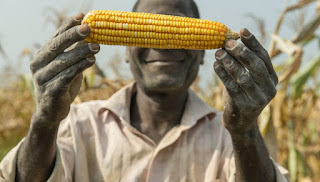GM crops
GM Crops - Burgeoning issue
In 2018, 35% of Kenya's GDP came from the agriculture sector. In Kenya, over 70% of the working age rural population works in the agricultural sector. 90% of Sub-Saharan Africa's is reliant on rain-fed agriculture. Africa and Kenya's over-reliance on this type of agriculture means that droughts can cause huge financial problems and reduce food security massively. In 2016, small holder farmers in eastern Kenya lost more than 80% of their crops. Kenya recently took the steps to lift bans on genetically modified crops to help ease some of the pressure.
Benefits of GM
Africa's population is predicted to increase by over 1 billion by 2050. Compared to Africa's population, the share of genetically engineered crop acreage is very small and only commercially cultivated in four countries. The growing population will need to sustain itself with both food crops and cash crops to continue economic development. Studies have also shown that GM crops can help reduce rural poverty.
Traditional methods of increasing plant water stress on agriculture is slow, and a rapidly changing climate means we no longer have time on our side. Some cash crops, such as coffee, have need at least 30 years to develop a new cultivar. Using genetic modification could produce crops with higher plant water tolerance. Stress resistance isn't the only potential benefit. Staple foods could have increased nutritional value too!
Negatives of GM
Kenya's main agricultural exports are tea, coffee, flowers and vegetables. I'm not sure multinational drinks producers will be comfortable with buying GM tea. GM crops aren't good as cash crops. A study performed in Uganda found that urban consumers were less likely to buy GM bananas. Exporters could see a decrease in demand if their product is perceived as being worse. If Kenya is exporting GM crops, would they fetch the same price as the "natural" variety? Ultimately, lower exports bring in less tax, decreasing the governmental funding and causing further reductions the country's development.
GM seeds are single generation. Selling sterile seeds forces the farmer to become reliant on the corporation to sell the seeds. This means the production of GM crops is not self-sustaining and would result in the reliance in rain-fed agriculture being changed to a reliance on access to seeds. Would increasing this reliance on generally non-African owned corporations reenforce colonialist ideas within Kenya?




Hi Tim- do you have any thoughts on whether you're for or against the production of GM crops in Kenya?
ReplyDeleteThanks, Briony!
Hi Briony
DeletePersonally, I am for the use of GM crops but not in the current format. I believe the crops that have been genetically modified to be more drought and pest resistant should be given to the communities, and that the corporations that have created them need to use them for the good of the people rather than the good of the corporation. Allowing their use could create systems in place where people are become more reliant on the supply from the private companies, reenforcing those colonial ideals that Africa is trying to move away from.
I also believe no company should be able to own a plant so turning ownership of these products from private to public should happen.
Tim